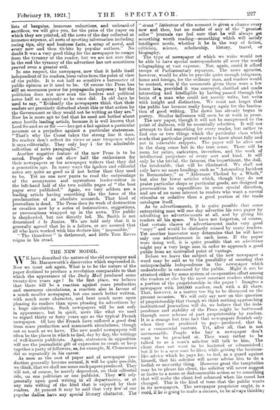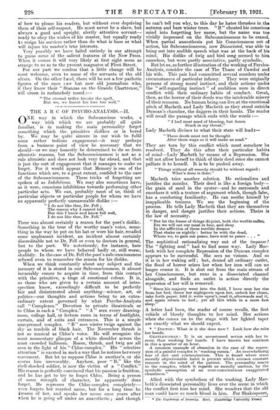THE. NEW MODEL.
WE have described the nature of the old newspaper and Mr. Harmsworth's discoveries which superseded it. Now we must ask again, What is to be the nature of the paper destined to produce a revolution comparable to that which the appearance of the Daily Mail produced some twenty-five years ago ? In the first place, we believe that there will be a reaction against mass production and enormous circulations, a reaction also in favour of a much smaller newspaper, but one much better written, with much more character, and bent much more upon pleasing its readers than upon pleasing its advertisers by a huge circulation. Such newspapers will be not only in appearance, but in spirit, more like what we used to regard thirty or forty years ago as the typical French newspaper. Of late the French have suffered a good deal from mass production and mammoth circulations, though not so much as we have. The new model newspapers will often be the places in which to find, day by day, the writings of well-known publicists. Again, statesmen in opposition will use the journalistic gift of expression to create or keep together a party of followers, as, for example, M. Clemenceau did so repeatedly in his career.
As soon as the cost of paper and of newspaper pro- duction generally become normal, it will be quite possible, we think, that we shall see some such papers produced. They will not, of course, be merely dependent, on their editorial side, on one politician or one publicist. They will rely generally upon good writing in all departments, or at any rate writing of the kind that is enjoyed by their readers. At present it may be said that very few of our popular dailies have any special literary character. The " stunt " litterateur of the moment is given a chance every now and then, but no reader of any of the " greatest seller " journals can feel sure that he will always get something worth reading—something which will satisfy intelligent needs, whether it be in the way of fiction, criticism, science, scholarship, history, travel, or biography.
The type of newspaper of which we write would not be able to have special correspondents all over the world telegraphing at vast expense. Nor, again, could it afford troops of Parliamentary reporters. The news agencies, however, would be able to provide quite enough telegrams1 home and foreign, for the ordinary man, and readers would be content, even if the comments given them were a few hours late, provided it was conveyed, clarified and made interesting and intelligible by having passed through the brain of a man who could not merely write, but write with insight and distinction. We must not forget that the public has become really hungry again for the fascina- tion of good writing. The dawn has already begun in poetry. Similar influences will soon be at work in prose.
The new paper, though it will not be compressed to the point of dullness, will be essentially selective. It will not attempt to find something for every reader, but rather to find one or two things which the particular class which reads that particular journal wants to know about fully and not in miserable snippets. The paper will be alive not in the slang sense but in the true sense. There will be room for satire, caricature, invention, and the work of intellectual projectors of every sort and kind. It will only be the trivial, the fatuous, the impertinent, the dull, the intolerable, that will be eliminated. We shall not only have no more headings such as " Astounding Incident iu Bermondsey," or " Alderman Choked by a Whelk," but also far fewer articles which, though they do not praise particular shops or particular goods, are designed as provocatives to expenditure in some special direction, and are of no more interest to readers who want a mental stimulus or sedative than a good portion of the trade catalogue itself. As to advertisements, it is quite possible that some enterprising man will one day advertise his own paper by admitting no advertisements at all, and by giving his readers all his space. We have not forgotten, of course, that certain classes of advertisement make very good " copy" and would be distinctly missed by many readers. Yet another innovator may determine that he will have only one advertisement in each issue. If the paper were doing well, it is quite possible that an advertiser might pay a very large sum in order to approach a good plie from an unrivalled point of vantage. Before we leave the subject of the new newspaper a word may be said as to the possibility of securing that unimpeachable independence in the newspaper which undoubtedly is esteemed by the public. Might it not be attained either by some system of co-operative effort among the readers or else by the most constant readers obtaining a portion of the proprietorship in the paper ? Imagine a newspaper with 100,000 readers, each with a f6 share. That, however, is a matter too big to be discussed on the present occasion. We will only say now on this question of proprietorship that though we think nothing approaching institutional journalism will do, we believe that the inde- pendence and stability of the Press might be buttressed through some scheme of part proprietorship by readers. It is a, strange but true fact that newspapers flourish only when they are produced to pay—produced, that is, as a commercial venture. Yet, after all, that is not unreasonable. People who buy a newspaper don't want to be preached at. They want rather to be talked to as a man's solicitor will talk to him. The client does not want to be hectored or admonished ; but if he is a sane man he likes, while getting the business- like advice which he pays for, to feel, as a guard against himself, that his solicitor will never advise him to do a foolish or unworthy thing. However great the temptation may be to please his client, the solicitor will never suggest or incite to a mean or dishonourable action or to something that will make the client feel ashamed when his mood has changed. This is the kind of tone that the public wants in its newspapers. The newspaper proprietor ought, in a word, it he is going to make a success, to be always thinking of how to please his readers, but without ever depriving them of their sell-respect. He must never be a slave, but always a good and upright, alertly attentive servant— ready to obey the wishes of his master, but equally ready b resign his services rather than do what is base or what will injure his master's true interests. Very possibly we have failed entirely in our attempt to guess some of the salient features of the New Press. When it comes it will very likely at first sight seem as strange to us as to the present magnates of Fleet Street. For our part we confess that a little change will be most welcome, even to some of the servants of the old altars. On the other hand, there will be not a few pathetic figures of the once I ew but now old journalism who, if they know their " Stanzas on the Grande Chartreuse," will croon in melancholy mood :— " The eternal trifler breaks the spell,
But we, we learnt his lore too well."



































 Previous page
Previous page